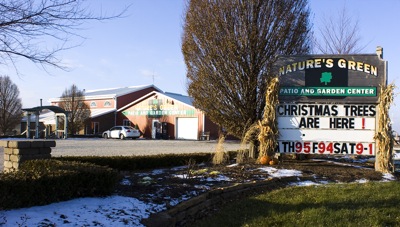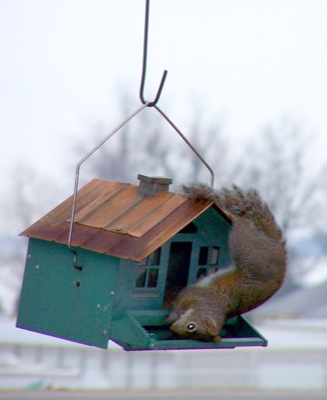Friday, December 3rd, 2010
Land eyed for manure digester
By William Kincaid

Photo by Mark Pummell/The Daily Standard
Optional Energy Partners of Florida wants to purchase 20 acres of land - the site of the former Garden Emporium - along state Route 29 for a manure digester.
CELINA - A Florida company is planning to purchase 20 acres of land west of Celina to construct a manure digester.
Optional Energy Partners has an optional purchase agreement for the land at 5150 state Route 29 West - site of the former Garden Emporium. Company owner Andy Tangeman said plans are for the digester to be located on the back half (southern portion) of the property.
On Thursday, Celina City Council members passed first reading of an ordinance to purchase electricity from the plant. A motion to suspend the rules to allow the legislation to be passed as an emergency measure failed, as council members Ed Jeffries and Mike Sovinski both voted no, saying they want city administration to finalize the energy rate schedule.
Celina Planning and Community Development Director Kent Bryan told council members there is no upfront cost to the city. It will only be required to buy all of the electricity from the plant - expected to be 1 megawatt hour.
According to the tentative rate schedule, the city would pay as much as $100 a megawatt as long as 100 percent of the manure used to produce the electricity is taken from the Grand Lake St. Marys Watershed - a provision intended to help reduce phosphorous loading that leads to degraded water in Grand Lake. The price would drop to as low as $60 a megawatt if the company uses 60 percent or less manure from the watershed.
Mark Pursley, a marketing and project development official at Optional Energy Partners, told council the plant initially would use dairy manure, though he did not state how it would acquire the manure or if it would pay farmers for the product. Bryan told council the common statistic used is that every megawatt of electricity removes the waste of 5,000 cows.
"It's our hope to create an environment where it becomes an accepted part of the community," Pursley said.
He said odor would be minimal as the digester plant would be a contained system.
Bryan said the manure digester process would produce 100,000 gallons of effluent. The company plans to extract the phosphorous out of the effluent to sell as a commodity - organic material. But until the company can verify to the EPA that the effluent is essentially pure water that can be dumped into a creek, the company would dump it into the city's sewer system.
"We do have the capacity for that," Bryan told council. "This is a pretty significant number for us and a pretty significant number for them."
The discharge to the city's sewer system would cost the company $250,000 a year, Bryan said.
Pursley told council it would probably take the company two years to prove to the EPA that its effluent is pure water.
As for the electric system, Optional Energy Partners would be responsible for all interconnection costs from the generation site to the city's current distribution system located at the intersection of state Route 29 and Meyer Road.
The company also would design, construct and pay for the required sewer system improvements to service the property. However, the city would try to obtain a grant to assist with funding for the sanitary sewer system extension.
The company also would work with the city to establish the property as a Joint Economic Development District so the city could capture the income tax from the business and its employee base, Bryan said. The business is expected to create about 10 jobs, Tangeman estimated.
Other byproducts of the digester would be organics such as bedding and high value soil amendments, Pursley said. He also talked about the possibility of using the existing greenhouses for organics, such as hydroponic tomatoes and other vegetables.
Council members will meet at 4:30 p.m. Monday in the utilities conference room for a special meeting to vote on the second reading of the ordinance.
City will only buy plant's power:
CELINA - Only two words make Celina Planning and Community Development Director Kent Bryan cringe: blue goose.
Bryan said the manure digester plant to be built west of Celina should not be perceived as a possible blue goose - the derisive moniker given to the city's failed power plant in the 1970s. The blue goose was built in 1969 and was plagued by problems from the beginning. It never produced enough power to run the city and was finally shut down permanently in the spring of 1973. It was just torn down a few years ago.
Bryan pointed out that the city has no investment or interest in the manure digester other than purchasing its renewable electricity. If anything would go wrong, it would not be the city's problem as it does not intend to finance the project or purchase the land for the plant.
City council President Jason King said he received a call from a concerned citizen wondering what would happen if the plant fails.
"The community does not want to see another blue goose," King said.
Bryan once again responded that the city would have no upfront investment.
"All we're doing is electricity," he said.
King also asked what would happen with the structures on the property if the plant fails. The plant is planned to go on the site of the former Garden Emporium along state Route 29 West. Other council members responded that it would be Optional Energy Partners' concern, not the cities.
Councilman Ed Jeffries asked if the company has a manure digester up and running.
"We've got pieces of this up and running, but not all together," Mark Pursley, a marketing and project development official of Optional Energy Partners, said.
Pursley provided little specifics about the plan, but Andy Tangeman, president of the company, in the past told the newspaper that plans were to construct a $3 million plant once a site was secured.
Tangeman in August said he wanted to lease county-owned land for the digester but then opted to seek private property. When talk of the plant first surfaced, Celina city officials said a possible location was private land near the intersection of U.S. 127 and Brown Road. Neighbors of that site objected, saying they were worried about odor and decreased property values.
Tangeman told the newspaper in August that a manure digester plant would help preserve the robust agricultural heritage of the area while creating an ancillary energy industry that is the wave of the future.
- Bill Kincaid

